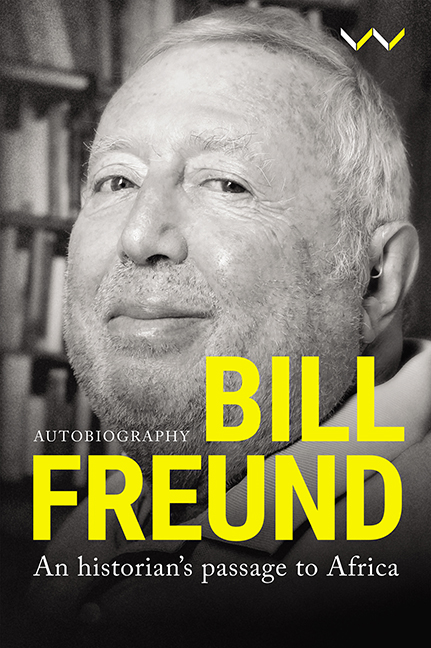Book contents
- Frontmatter
- Contents
- Foreword: Bill Freund and the Making of His Autobiography
- Family Tree
- A Brief Introduction
- 1 The Austrian Past
- 2 The Aftermath of War: A Perilous Modernity
- 3 The Dark Years
- 4 A New Life in America
- 5 Adolescence: First Bridge to a Wider World
- 6 As a Student: Chicago and Yale
- 7 As a Student: Africa and England
- 8 The Tough Years Begin
- 9 An Intellectual and an African: Nigeria
- 10 An Intellectual and an African: Dar es Salaam and Harvard
- 11 South Africa, My Home
- Notes
- Select Bibliography of Bill Freund’s Publications
- List of Illustrations
- Author’s Acknowledgements
- Supplementary Acknowledgements
- Index
7 - As a Student: Africa and England
Published online by Cambridge University Press: 15 June 2021
- Frontmatter
- Contents
- Foreword: Bill Freund and the Making of His Autobiography
- Family Tree
- A Brief Introduction
- 1 The Austrian Past
- 2 The Aftermath of War: A Perilous Modernity
- 3 The Dark Years
- 4 A New Life in America
- 5 Adolescence: First Bridge to a Wider World
- 6 As a Student: Chicago and Yale
- 7 As a Student: Africa and England
- 8 The Tough Years Begin
- 9 An Intellectual and an African: Nigeria
- 10 An Intellectual and an African: Dar es Salaam and Harvard
- 11 South Africa, My Home
- Notes
- Select Bibliography of Bill Freund’s Publications
- List of Illustrations
- Author’s Acknowledgements
- Supplementary Acknowledgements
- Index
Summary
Beginning in 1969, I had my first real encounter with Africa, itself part of a more complicated trajectory through Europe as well. This was a long and wonderful trip, lasting more than a year, which I was very sorry to bring to an end. To give a simple account, it can be divided into four parts. The first was a phase of three months which I spent researching for my PhD in the Dutch archives and living in The Hague. The second was a further archival research phase, this time in Cape Town. The third was a remarkable trip through Africa based on the way flights could be arranged and paid for in those days: to Lesotho, Kenya and Tanzania, Ethiopia, Egypt and out via Cyprus. The fourth was harder to justify. Reunited with my fieldnotes (index cards!) faithfully taken to Oxford by a South African DPhil student, Chris Saunders, aboard a Union-Castle liner, which still transported people from the Cape to Southampton, I spent the last months starting to write up my thesis as a visitor to St Antony's College, Oxford. But those few months had the biggest long-term consequences.
In Africa, I certainly had a stunning time encountering the antiquities of Egypt and Ethiopia, seeing some of the awesome scenery of East Africa (Ngorogoro Crater, Lake Naivasha, Kilimanjaro) and, following my introduction to Kiswahili in UCLA, having an enjoyable look at the East African coast where the classic coastal culture spoke to me. It was sufficiently urban and had enough charm and handicraft and cuisine to appeal to me. I should be dishonest if I did not admit that the more typical African village culture that I saw, often through the eyes of young American researchers and Peace Corps volunteers whom I visited, did not draw me in. Much of the historiography of Africa as it was then developing (under the strong influence of the University of Wisconsin) was virtually ethnographic, explorations of the minds of the typical villagers, sufficiently localised to make generalisations beyond a point very difficult. In effect African history was colonised by the better-developed field of anthropology. While I admired the best fieldwork expositions, I could not say that I was taken with the theoretical ideas in anthropology or its general project.
- Type
- Chapter
- Information
- Bill FreundAn Historian's Passage to Africa, pp. 95 - 108Publisher: Wits University PressPrint publication year: 2021



